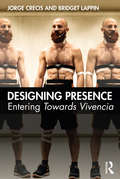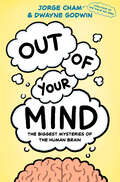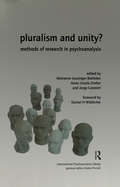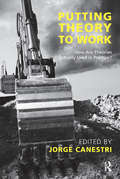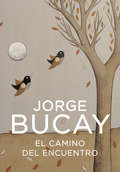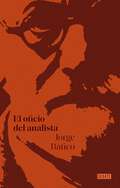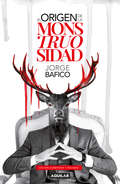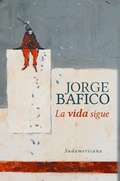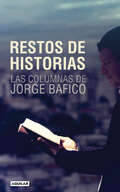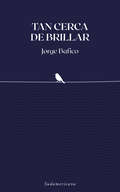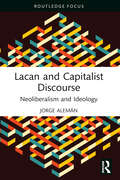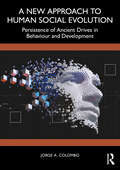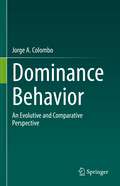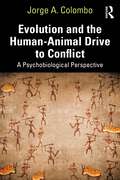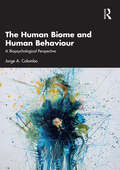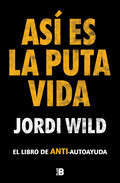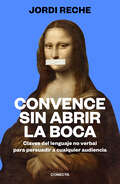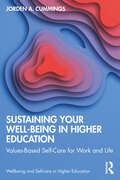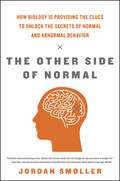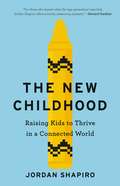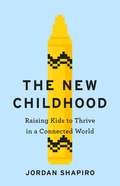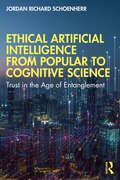- Table View
- List View
Designing Presence: Entering Towards Vivencia
by Jorge Crecis Bridget LappinDesigning Presence offers a unique insight into the training that has helped people around the world to cultivate more presence in both professional and personal settings. It explains the research behind the method of Towards Vivencia, shares stories of how it has been implemented and offers practical exercises to apply it in any context. Presence is something that is often talked about but is difficult to pin down. We have all experienced moments when we felt one with what we are doing and with our environment. However, this feeling is usually fleeting and we don’t know when or how we will experience it again. Towards Vivencia is the first methodology of its kind to train performers to locate and replicate that specific state of consciousness associated with presence and peak performance. Based on over 20 years of experience, combined with research in anthropology, philosophy and the latest advances in neuroscience, Towards Vivencia enables performers to become fully engaged with their experience in order to operate at their highest possible level. This book aims to equip readers with the ability to actively design their experiences and create lasting changes not only in how they approach performance but also how they approach their everyday lives.
Out of Your Mind: The Biggest Mysteries of the Human Brain
by Jorge Cham Dwayne GodwinFrom the creator of WE HAVE NO IDEA, an introductory journey into your own mind—if your inner voice had a Ph.D. in brain science, cracked jokes, and drew cartoons.Why do you love? Why do you lie? What makes you happy? Every single thought you have comes from one place: your brain. But what makes it tick? How much of it have we decoded, and how much of it remains an impenetrable mystery? Join best-selling author and online cartoonist Jorge Cham and neuroscientist Dwayne Godwin on a deep dive into the fascinating world of the human brain, in which they will explore questions such as: What is consciousness? Where is you in the brain? And do we have free will? All while illuminating everything we know (and DON&’T know) about one of the most complex objects in the known universe. Think of it as conversation-ammunition for your next cocktail party, or a quick fascinating read while you&’re in the bathroom (don&’t worry, the chapters aren&’t that long). Centered around questions we all ask ourselves at some point but don&’t usually have answers to, Out of Your Mind is an illustrated book about the brain that isn&’t too brainy. Playful, accessible, and deeply insightful, it&’s the one brain book that&’s truly accessible and suitable for all brains.
Pluralism and Unity?: Methods of Research in Psychoanalysis
by Jorge CanestriThis book compiles the papers presented at an International Conference, "Pluralism of Sciences: The Psychoanalytic Method between Clinical, Conceptual and Empirical Research" in 2002. It provides the variety and diversity of psychoanalytic research cultures in different psychoanalytic societies.
Putting Theory to Work: How are Theories Actually Used in Practice? (The Developments in Psychoanalysis Series)
by Jorge CanestriThis book contains a continuation and expansion of the topics covered in the author's previous book, Psychoanalysis: from Practice to Theory, about the use of theories in analytic practice. As a member of the International Psychoanalytical Association (IPA) Conceptual Research Committee and Chair of the Working Party on Theoretical Issues, the author, who teaches at Nanterre University, has studied and taught on the subject for several years, as well as writing many articles on it. The book will be particularly useful for psychoanalytical and psychotherapeutic societies, as well as for research committees.
El camino del encuentro
by Jorge BucayEn este libro aprendemos que nuestra felicidad no puede depender totalmente de otra persona y que el hombre tampoco está preparado para ser completamente independiente. El doctor Bucay nos enseña que hemos de seguir el camino de la autodependencia tomando la responsabilidad de nuestra propia vida.El camino del encuentro nos invita a ir más allá, a investigar nuestra capacidad de amar al otro. El autor replantea los conceptos de convivencia, sexo, confianza, contacto y lo que implican en la familia y en la pareja.
Hojas de ruta
by Jorge BucayQuizás estas Hojas de Ruta puedan servir a algunos de los que, como yo, suelen perder el rumbo, y quizás, también a aquellos que suelen encontrar atajos. De todas maneras, el mapa nunca es el territorio y habrá que ir corrigiendo el recorrido cada vez que nuestra propia experiencia encuentre un error del cartógrafo. Sólo así llegaremos a la cima. Ojalá nos encontremos allí. Jorge Bucay Esta edición reúne los cuatro volúmenes de la colección Hojas de Ruta, El camino de la Autodependencia El camino del Encuentro El camino de las Lágrimas y El camino de la Felicidad en un solo tomo. "posiblemente habrá que arrancar solo y sorprenderse al encontrar, más adelante en el camino, a todos los que seguramente van en la misma dirección. Éste rumbo último, solitario, personal y definitivo, sería bueno no olvidarlo, es nuestro puente hacia los demás, el único punto de conexión que nos une irremediablemente al mundo de lo que es. Llamemos al destino final como cada uno quiera: felicidad, autorrealización, elevación, iluminación, darse cuenta, paz, éxito, cima, o simplemente final... lo mismo da. Todos sabemos que arribar con bien allí es nuestro desafío."
El oficio del analista
by Jorge BaficoUn libro de consulta imprescindible para estudiantes de psicología, pero que también será atractivo para cualquier lector interesado en la temática. ¿Qué se hace en ese lugar llamado análisis? ¿Cuáles son las diferencias entre el psicoanálisis, las psicoterapias o, incluso, en las conversaciones profundas e íntimas que pueden darse entre dos personas? En definitiva, ¿de qué se trata lo singular de un análisis? Este libro intenta desvelar estas y otras interrogantes que surgen del quehacer psicoanalítico. Sus contenidos tienen como punto de partida el seminario «El oficio del analista», que Jorge Bafico llevó adelante entre los años 2018 y 2021. Durante estos encuentros, el autor indaga en el misterio que muchas veces encierra un psicoanálisis, a partir de diferentes casos clínicos. Con su habitual estilo ameno y cómplice con el lector, Jorge Bafico dialoga en cada capítulo con textos teóricos y casos clínicos, para presentar con mayor claridad las diferentes modalidades en que el analista se pone en juego.
El origen de la monstruosidad
by Jorge BaficoJorge Bafico recorre las increíbles historias de psicóticos, asesinos seriales y monstruos morales. La monstruosidad está entre nosotros. Todos los días leemos o escuchamos historias de personas capaces de cometer las más grandes atrocidades sin sentir remordimientos. A menudo se trata de personas consideradas socialmente como “normales”, adaptadas, incluso anodinas. ¿Qué los impulsa en la búsqueda hacia el dolor? ¿Dónde está la línea que separa la cordura de la locura? ¿Todos somos potencialmente seres monstruosos? A través del vértigo de una lectura adictiva, este libro inquietante nos precipita por los oscuros pasadizos de la psique humana.
La vida sigue
by Jorge BaficoEste libro es un recorrido y un homenaje. Una invitación a conocer las zonas más complejas de la psique humana, a través de diferentes historias de pacientes. También es un homenaje a la figura de Dagoberto Puppo, un gran médico que ha sido maestro, ejemplo y amigo del autor. El psicoanalista Jorge Bafico y el psiquiatra Dagoberto Puppo recorrieron un largo camino juntos. Un sólido vínculo afectivo y profesional los arropó mientras trabajaron con muchos pacientes. Tras el fallecimiento de Dagoberto en abril de 2009, Jorge supo que tenía que escribir este libro. Recorriendo sus páginas, el lector se encontrará con casos clínicos que tocan la locura, y que al mismo tiempo se convierten en cercanos. Bafico nos acerca a la patología en su versión más cotidiana, desde el respeto y una profunda sensibilidad. Un encuentro con la clínica desde dentro, moldeada a través del vínculo con Dagoberto. Este libro es también un homenaje a un gran médico que ha sido maestro, ejemplo y amigo del autor. Cómo él mismo dice: #Hay hombres que son excepcionales. Dagoberto lo fue y yo tuve la suerte de conocerlo#. Con un lenguaje directo y luminoso, Jorge Bafico nos invita a conocer esta historia de aprendizajes, gratitud y esperanza, pero también de angustia y dolor. Fiel a su estilo, cada texto está acompañado por citas musicales que complementan y amplifican el sentido de cada capítulo.
Restos de historias
by Jorge BaficoLa columna de Bafico en Abrepalabra (Océano FM) se ha transformando enun ámbito para mostrar cuestiones de lo cotidiano (libros, películas,series, hechos de la realidad) con una mirada psicoanalítica y con unimportante componente: la música. Este libro está lleno de restos que sedesprenden de esas historias. Jorge Bafico es psicoanalista, pero también es comunicador. Escribe yhabla muy bien. Me agrada encontrarme con un columnista queprepara cada uno de los conceptos que comparte con la audiencia. Tendríaque ser moneda corriente, pero no lo es.Jorge elabora cada columna como si fuese un periodista o escritor quetiene que crear una historia con un buen comienzo, un desarrollo y unfinal.Me atrapó su mirada sobre la sociedad. Compartimos la escucha atenta yprofunda, la observación y la pregunta. Y, podría agregar, una granpasión por la lectura y la música.Durante mis años de profesión aprendí que la brevedad es una buenaconsejera en un mundo desbordado de mensajes y con fatiga crónica paradigerirlos. Eso sí, si se quiere profundizar se necesita tiempo delectura. Y esta es justamente mi invitación: tomarse un tiempo paradisfrutar de relatos que nos hacen repensar historias ajenas ?películas,series, libros, canciones?, pero que también, y sobre todo, nos haceninterrogarnos sobre nuestras propias historias.Gustavo Rey(Comunicador, conductor del programa Abrepalabra de Océano FM)
Tan cerca de brillar
by Jorge BaficoUn libro intenso y personal. La crónica de la pérdida de un hijo como motivo literario, que habilita y proyecta un recorrido emotivo y sanador a través de los vínculos familiares, la posibilidad de salir del dolor y recuperar la esperanza. Este libro es testigo de una batalla contra el dolor lacerante de una pérdida. Jorge Bafico intenta construir una ficción que se aleje de la angustia vivida, pescando palabras que sirvan para transmutar el sufrimiento y convertirlo en poesía. Estas páginas son parte de un relato dedicado a alguien que no pudo florecer. A través de la mirada compasiva y llena de empatía de su narrador, las personas y las situaciones retratadas iluminan el pasado y el presente, obrando el milagro de convertir el dolor en esperanza.
Lacan and Capitalist Discourse: Neoliberalism and Ideology
by Jorge AlemánLacan and Capitalist Discourse explores the political and theoretical connections between the Covid-19 Pandemic and Capitalism, unravelling the direct consequences of Lacan's thesis of so-called "Capitalist Discourse”. Jorge Alemán provides an account of neoliberalism, its mechanisms to produce subjectivities and the new modes of the political far Right. The book begins with the problem of a possible exit from capitalism, continuing to consider the possibilities of mourning and the active production of a new Left. Alemán engages deeply with a range of thinkers: primarily Lacan, but also Heidegger, Marx, Laclau, Foucault, Butler, Badiou, Althusser, and others, in making his case. Lacan and Capitalist Discourse will be of great interest to psychoanalysts and to academics of psychoanalytic and Lacanian studies, cultural theory, philosophy and political thought.
A New Approach to Human Social Evolution: Persistence of Ancient Drives in Behaviour and Development
by Jorge A. ColomboThis book provides an important examination into the role of evolution of human traits of dominance as central to understanding social and political events, proposing a new view on human social evolution. It also examines basic biological universal needs and behavioural profiles of non- human living beings, from which humans share essential survival components. It invites readers to think critically about the psychological evolution of the human brain. Using comparative psychology, it argues that the core of human behaviour lies in the ancient, animal, universal set of survival resources hidden under various socialization profiles. However, it generally fails to replace drives of dominance and aggression for physical and social survival. Genuine replacement of those primal behavioural drives would require fundamental neuro- socio- behavioural changes. This book supports the thesis that without education and the promotion of universal values involving environmental protection and individual opportunities to evolve, there will be negative consequences for individuals and communities. This book represents a critical tool for students of behavioural sciences, anthropology, politics, and evolutionary neurosciences, and will also greatly benefit other readers, such as teachers and professional researchers.
Dominance Behavior: An Evolutive and Comparative Perspective
by Jorge A. ColomboThis book approaches two behavioral domains involved with human nature and actions related to dominance, an ancient animal, survival-linked, behavioral drive anchored in basal neural brain circuits. These domains result in latent or manifest conflicts among components of human animal nature and cultural profiles. The first domain refers to evolutive animal behavioral inertias that affect the basic construction of our brain/mind and social behavioral spectrum, underneath cultural and political enclosures. The second domain is considered a consequence of the previous one and involves the concept that the basic animal behavioral drive of dominance interferes with the expression of a truly human, cooperative social construction, and fosters conflicts (based on profit or comparative advantage). This drive tints or conditions our behavior in all its expressions (parochial, social, political, financial, religious, cognitive development). It also fosters social detachment of elite minorities –financially powerful and drivers of human evolutionary trends– from general concerns and collective needs of legions of subdued populations. Additionally, the latter promotes Star Wars factual chimeras and expanding dominance/prevalence and power grip beyond earthbound objectives that promote spatial exploration and scientific objectives. The quest for knowledge is embedded in our behavioral construction but employed by opportunistic – political – strategies that seek dominance/prevalence.Basic, ancestral, animal drives, here focused on dominance, lie underneath our sociocultural expressions, and feed construction of survival, ideology, class prejudices, submissiveness, cooperativity, and technological development. On top of this basic drive, humans have construed additional relational levels (whether of cognitive or emotional nature) expressed as cultural constructions that provide means to attempt to approach a socially acceptable format and public support. Whenever these processes collide or collapse, individual and collective standings tend to generate social changes or individual or collective pathologies. This book should be an exciting read for all those enthusiasts of the human mind, behavior, and cultural evolution ranging from fields such as neuroscience and biology to political sciences and anthropology. Given the breadth of studies as well as the clear language used by the author, students will find this book as a resourceful material for the undergraduate and graduate studies.
Evolution and the Human-Animal Drive to Conflict: A Psychobiological Perspective
by Jorge A. ColomboEvolution and the Human-Animal Drive to Conflict examines how fundamental, universal animal drives, such as dominance/prevalence, survival, kinship, and "profit" (greed, advantage, whether of material or social nature), provide the basis for the evolutionary trap that promotes the unstable, conflictive, dominant-prone individual and group human behaviours. Examining this behavioural tension, this book argues that while these innate features set up behaviours that lean towards aggression influenced by social inequalities, the means implemented to defuse them resort to emotional and intellectual strategies that sponsor fanaticism and often reproduce the very same behaviours they intend to defuse. In addressing these concerns, the book argues that we should enhance our resources to promote solidarity, accept cultural differences, deter expansionist and uncontrolled profit drives, and achieve collective access towards knowledge and progress in living conditions. This entails promoting the redistribution of resources and creative labour access and avoiding policies that generate a fragmented world with collective and individual development disparities that invite and encourage dominance behaviours. This resource redistribution asserts that it is necessary to reformulate the global set of human priorities towards increased access to better living conditions, cognitive enhancement, a more amiable interaction with the ecosystem and non-aggressive cultural differences, promote universal access to knowledge, and enhance creativity and cultural convivence. These behavioural changes entail partial derangement of our ancestral animal drives camouflaged under different cultural profiles until the species succeeds in replacing the dominance of basic animal drives with prosocial, collective ones. Though it entails a formidable task of confronting financial, military, and religious powers and cultural inertias – human history is also a challenging, continuous experience in these domains – for the sake of our own self-identity and self-evaluation, we should reject any suggestion of not continuing embracing slowly constructing collective utopias channelled towards improving individual and collective freedom and creativeness. This book will interest academics and students in social, cognitive, and evolutionary psychology, the neurosciences, palaeoanthropology, philosophy, and anthropology.
The Human Biome and Human Behaviour: A Biopsychological Perspective
by Jorge A. ColomboThe book represents a critical update on interactions between the host and its gut microbiome that conditions the socio-biology of the mind and behaviour. Evidence has been scientifically approached and reveals that our conscious behaviour involves a complex interplay of multiple non-conscious domains, including complex host-gut microbiome relationships.The book describes trends and issues on which there is increasing evidence of the impact of host-gut microbiome interactions on behaviour and cultural construction of self-perception. This suggests the need to re-evaluate traditional, basic concepts of human development. Additionally, it calls attention to open issues involving conceptual themes on neurobiological integration and its impact on early developmental and social domains on the typical extended period of human postnatal helplessness during which the basic scaffolding of mental development is completed. It also deals with the impact of poverty and inadequate early feeding habits on individual cognitive development, performance, and social construction. It discusses the need to reformulate views and policies on social marginalisation, child poverty, and malnutrition involving host-gut microbiome imbalances.The spectrum of possible behaviours in all species and its plasticity depends on an integrated vector of basic components involving the genetic code, social and physical environmental, developmental conditions, the relative condition of dominance or submission in social settings –or prey/predator in the Natural Kingdom– and on its physiological and anatomical construction profiles.Graduate, postgraduate and teachers interested in areas connected with anthropology, social medicine, early education, and health policymakers will benefit greatly from this book.
Así es la puta vida: El libro de ANTI-autoayuda
by Jordi WildEl esperado libro de Jordi Wild, uno de los youtubers más populares de España y creador de The Wild Project, el pódcast más escuchado. Ni eres el centro del universo ni todos tus sueños van a cumplirse. Olvídate de las chorradas de los libros de autoayuda y de los gurús baratos que intentan hacerte creer que «si quieres, puedes»; de los crypto bros que te harán millonario sin trabajar y de los que te dicen que seas tu propio jefe mientras se graban en la piscina de la casa de sus padres. Aquí no encontrarás recetas mágicas ni los cinco pasos que tienes que seguir para SER FELIZ. Eso se lo dejo a los que se quieren aprovechar de ti. En este libro te voy a contar lo que para mí es la vida de verdad, sin edulcorantes ni azúcares añadidos; la jodida (y maravillosa) lucha que tienes que librar cada día para poder disfrutar y realizarte. La vidate dará una buena somanta de hostias, eso es inevitable, pero de ti depende levantarte y seguir guerreando. Vale la pena, te lo aseguro. ASÍ ES LA PUTA VIDA. ESPERO QUE ESTÉS PREPARADO PARA ACEPTARLO.
Convence sin abrir la boca: Claves del lenguaje no verbal para persuadir a cualquier audiencia
by Jordi RecheDescubre las claves del lenguaje no verbal para cautivar y persuadir a cualquier audiencia y en cualquier situación. En el entorno personal y profesional, nuestros gestos, miradas, posturas, sonrisas... dicen más de nosotros que las palabras que pronunciamos. Porque el lenguaje del cuerpo es revelador: cómo nos sentamos, cómo caminamos, cómo saludamos..., todo comunica. Los demás interpretan y recuerdan nuestros mensajes por lo que transmitimos a nivel visual mucho más que por lo que decimos. Pero ¿sabes qué expresas con tu cuerpo? Jordi Reche te descubre los secretos del lenguaje no verbal: qué significa cada gesto, por qué lo haces y cómo interpretarlo tanto en ti mismo como en los demás. Convence sin abrir la boca te proporciona las herramientas para dominar el lenguaje corporal y conectar con tus interlocutores. Aprende a utilizarlas para ser más convincente y persuasivo, transmitir mayor seguridad y confianza, y ganar influencia entre quienes te rodean. En este libro aprenderás: * A comunicar mejor, reforzando tu mensaje hablado con tu gestualidad. * A tener mayor consciencia de tu cuerpo y a utilizarlo para sentirte mejor y para que, quienes te rodean, te vean mejor. * A leer en los gestos de los demás información que han decidido no darte u ocultarte, o simplemente a descifrar que te están mintiendo.* A descubrir que tu poder de persuasión puede aumentar de manera significativa si cuidas tu lenguaje no verbal de líder. * A conocer mejor los mensajes que envían tus fotos de perfil, tus fotos grupales o los vídeos que cuelgas en las redes. * A detectar las emociones reales de una persona, más allá de lo que nos cuente con sus palabras. * A aumentar tu capacidad de seducción y a leer en el cuerpo de las personas con las que te relacionas si estás atrayendo su atención de manera positiva o no. Reseñas:«Con el libro de Jordi puedes aprender tanto a leer a los demás como a mejorar tu comunicación de una forma amena y entretenida. Puedes usarlo siempre que quieras para mejorar y llevar tu comunicación y conocimiento a otro nivel que no muchos conocen».Jose Fernández @soycriminologo. Experto en criminología y comportamiento no verbal«Jordi ha condensado en un libro una gran cantidad de trucos y técnicas para entender cómo funciona la comunicación no verbal. Esto permite que lo apliques es muchos ámbitos: en negociaciones, ventas, formaciones... Es un manual didáctico y directo que te ayudará a iniciarte de lleno en el apasionante mundo de la comunicación».Fernando Miralles. Formador y divulgador experto en oratoria«Jordi te explica paso a paso todo lo que cualquier comunicador debería saber, ya sea hablando con un cliente o frente a miles de espectadores. Sin duda, una caja de herramientas que todo profesional debería leer. Un título obligatorio para cualquiera que desee destacarse en su carrera».Nico Fernández Miranda. Empresario, conferencista y profesor universitario«En este mundo tan expeditivo Jordi nos enseña no solo cómo mejorar nuestro lenguaje corporal sino también cómo leer a quienes tenemos enfrente, esto nos ayudara luego a complementar nuestro objetivo final en una reunión o quizás en esa charla incomoda que tanto evadimos. Aquí aprenderás cómo congeniar eso que quieres decir no solo con palabras si no con todo tu cuerpo».Evelina Cabrera. Entrenadora de fútbol, coach deportivo y escritora
Dolor crónico: Procedimiento de evaluación e intervención psicológica
by Jordi Miró MartínezEl dolor es un tema de especial relevancia. Su misma existencia resulta un reto para los profesionales de la salud, no en vano es la principal causa de búsqueda de atención médica y sanitaria. El estudio y tratamiento del dolor se ha convertido en un campo de encuentro de profesionales de disciplinas científicas diversas. En este libro se analizan las aportaciones de la Psicología y la situación actual de su relación con el dolor crónico. Se trata de presentar e instruir al lector interesado sobre los procedimientos de evaluación y técnicas de intervención que existen y de sus resultados, así como de detallar las bases teóricas que los sustentan. El autor ofrece una guía para la evaluación y el tratamiento de los problemas de dolor crónico, y plantea y responde a cuestiones de importancia para el futuro del área.
Sustaining Your Well-Being in Higher Education: Values-Based Self-Care for Work and Life (Wellbeing and Self-care in Higher Education)
by Jorden CummingsThis book provides an evidence-based approach to sustainable self-care, anchoring these strategies in individual academic workers’ core personal values. It teaches readers how to use their values to leverage self-care strategies into a workable, individualized, and effective map to wellness.Working in the demanding environment of higher education can leave little time for self-care, yet making space for wellness and self-care is essential to creating a creative and innovative environment for academic work. This book shows how to create and successfully implement realistic self-care plans. By identifying core values and using these to develop individualized self-care plans, Sustaining Your Well-Being in Higher Education pushes back against a one-size-fits-all approach while also discussing the role of self-care in academic labor activism and providing strategies for readers to become advocates for better self-care practices within their zones of influence.Designed to provide academic workers with the skills they need to develop workable and sustainable self-care plans, this book is an invaluable resource for students and professionals working in all areas of higher education.
The Other Side of Normal: How Biology Is Providing the Clues to Unlock the Secrets of Normal and Abnormal Behavior
by Jordan SmollerPsychiatry has ignored the normal. The focus on defining abnormal behavior has obscured what turns out to be a more fundamental question—how does the biology of the brain give rise to the mind, which in turn gives rise to everything we care about: thoughts, feelings, desires, and relationships? In The Other Side of Normal, Harvard psychiatrist Jordan Smoller shows us that understanding what the mind was designed to do in the first place demystifies mental illness and builds a new foundation for defining psychiatric disorders—from autism to depression. Smoller argues there are no bright lines between normal and abnormal. Psychiatric disorders are variations of the same brain systems that evolved to help us solve the challenges of everyday life. How do we become who we are? Smoller explains where our personalities come from, and how the temperaments we had as infants actually stay with us into adulthood. Why do we choose to date, love, and marry the people we do? Why do some of us form healthy relationships while others form unstable ones? Our relationships are shaped by the biology that drives two imperatives: maternal-child bonding and child-parent attachment. Along the way, Smoller tackles an even greater question—what do we mean by "normal"?—as he explores the puzzles behind the epidemics of multiple personalities and koro, the shocking phobia that one's penis is shrinking. He also looks at the controversial history of psychiatric classification and the explosive debates over how much early experiences influence our minds and to what degree genetics affect our temperaments, personalities, and emotional lives. Throughout this examination, Smoller explores the hidden sides of such questions as: How are trust and love rooted in biology? How much does sexual attraction stem from biology rather than culture? And what can the scientific study of normal behavior tell us about what it means to be human?Based on the author's groundbreaking research and personal experiences treating psychological disorders, The Other Side of Normal changes the way we think about the human condition.
The New Childhood: Raising Kids to Thrive in a Connected World
by Jordan ShapiroA provocative look at the new, digital landscape of childhood and how to navigate it.In The New Childhood, Jordan Shapiro provides a hopeful counterpoint to the fearful hand-wringing that has come to define our narrative around children and technology. Drawing on groundbreaking research in economics, psychology, philosophy, and education, The New Childhood shows how technology is guiding humanity toward a bright future in which our children will be able to create new, better models of global citizenship, connection, and community.Shapiro offers concrete, practical advice on how to parent and educate children effectively in a connected world, and provides tools and techniques for using technology to engage with kids and help them learn and grow. He compares this moment in time to other great technological revolutions in humanity's past and presents entertaining micro-histories of cultural fixtures: the sandbox, finger painting, the family dinner, and more. But most importantly, The New Childhood paints a timely, inspiring and positive picture of today's children, recognizing that they are poised to create a progressive, diverse, meaningful, and hyper-connected world that today's adults can only barely imagine.
The New Childhood: Raising kids to thrive in a digitally connected world
by Jordan ShapiroIT'S TIME FOR A NEW APPROACH TO SCREEN TIME.Jordan Shapiro believes we need to rethink parental attitudes to technology. There's a damaging orthodoxy that presents screen-time as the ultimate modern parenting evil and the only acceptable response to it is restriction. Shapiro, psychologist, educational pioneer and father of two, draws on cutting-edge research in education, philosophy, neuroscience and psychology to show we've let fear and nostalgia stand in the way of our children's best interests. In his optimistic, inspiring and practical guide to the new, digital frontier of childhood, he reframes gaming, social media and smartphones to offer fresh, evidence-based advice on how to take a more progressive approach.*Winner of the Spirituality & Practice Book Award as one of the 50 Best Spiritual Books of 2018.*'Shapiro successfully transforms our worst fears about screen time into excitement about the potential for redesigning childhood around our latest technologies ... It's a necessary book that I urge you to read.' - The Telegraph'Shapiro knows what he's talking about ... Shapiro's arguments are compelling' - USA Today'a thought-provoking, bold read. As a father of two daughters at similar ages to Jordan's children (7 and 9), facing similar challenges and dilemmas, the book provided me with an inspiring and optimistic perspective that's rare in the current media landscape.' - Variety'Timely, essential, and thought-provoking, The New Childhood is the must-read parenting guide for raising 21st century, digitally driven kids. Instead of raising a white flag and giving in to social media and the Internet, Jordan Shapiro tells parents how to embrace technology, stay involved in their children's lives, and prepare them for their future. Read it! I promise you'll rethink your parenting. I couldn't put it down' - Michele Borba, EdD, author of UnSelfie: Why Empathetic Kids Succeed In Our All-About-Me World
Ethical Artificial Intelligence from Popular to Cognitive Science: Trust in the Age of Entanglement
by Jordan Richard SchoenherrThis book offers a unique interdisciplinary perspective on the ethics of 'artificial intelligence' – autonomous, intelligent, (and connected) systems, or AISs, applying principles of social cognition to understand the social and ethical issues associated with the creation, adoption, and implementation of AISs. As humans become entangled in sociotechnical systems defined by human and artificial agents, there is a pressing need to understand how trust is created, used, and abused. Compounding the difficulty in answering these questions, stakeholders directly or indirectly affected by these systems differ in their motivations, understanding, and values. This volume provides a comprehensive resource to help stakeholders understand ethical issues of designing and implementing AISs using an ethical sensemaking approach. Starting with the general technical affordances of AIS, Dr. Jordan Richard Schoenherr considers the features of system design relating data integrity, selection and interpretation of algorithms, and the evolution processes that drive AISs innovation as a sociotechnological system. The poles of technophobia (algorithmic aversion) and technophilia (algorithmic preference) in the public perception of AISs are then described and considered against existing evidence, including issues ranging from the displacement and re-education needs of the human workforce, the impact of use of technology on interpersonal accord, and surveillance and cybersecurity. Ethical frameworks that provide tools for evaluating the values and outcomes of AISs are then reviewed, and how they can be aligned with ethical sensemaking processes identified by psychological science is explored. Finally, these disparate threads are brought together in a design framework. Also including sections on policies and guideline, gaming and social media, and Eastern philosophical frameworks, this is fascinating reading for students and academics in psychology, computer science, philosophy, and related areas, as well as professionals such as policy makers and those working with AI systems.
Ethical Artificial Intelligence from Popular to Cognitive Science: Trust in the Age of Entanglement
by Jordan Richard SchoenherrThis book offers a unique interdisciplinary perspective on the ethics of 'artificial intelligence' – autonomous, intelligent, (and connected) systems, or AISs, applying principles of social cognition to understand the social and ethical issues associated with the creation, adoption, and implementation of AISs.As humans become entangled in sociotechnical systems defined by human and artificial agents, there is a pressing need to understand how trust is created, used, and abused. Compounding the difficulty in answering these questions, stakeholders directly or indirectly affected by these systems differ in their motivations, understanding, and values. This volume provides a comprehensive resource to help stakeholders understand ethical issues of designing and implementing AISs using an ethical sensemaking approach. Starting with the general technical affordances of AIS, Dr. Jordan Richard Schoenherr considers the features of system design relating data integrity, selection and interpretation of algorithms, and the evolution processes that drive AISs innovation as a sociotechnological system. The poles of technophobia (algorithmic aversion) and technophilia (algorithmic preference) in the public perception of AISs are then described and considered against existing evidence, including issues ranging from the displacement and re-education needs of the human workforce, the impact of use of technology on interpersonal accord, and surveillance and cybersecurity. Ethical frameworks that provide tools for evaluating the values and outcomes of AISs are then reviewed, and how they can be aligned with ethical sensemaking processes identified by psychological science is explored. Finally, these disparate threads are brought together in a design framework.Also including sections on policies and guideline, gaming and social media, and Eastern philosophical frameworks, this is fascinating reading for students and academics in psychology, computer science, philosophy, and related areas, as well as professionals such as policy makers and those working with AI systems.
